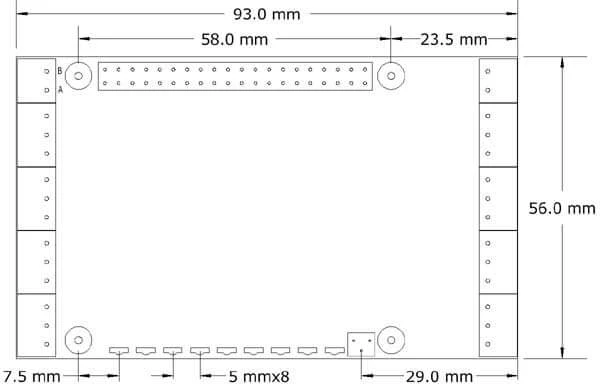- Sequent Microsystems Multi-IO 8-Layer Stackable HAT for Raspberry Pi
- Combines interfaces for Industrial Automation
- Expands up to 8 layers for IO versatility
- Operates using only the I2C port
- Includes RTD ports with high-res A/D converters
- Features a wide-range power supply
The Sequent Microsystems Multi-IO 8-Layer Stackable HAT for Raspberry Pi combines essential interfaces for Industrial Automation, including digital and analog inputs and outputs, RTD measurement, and relays. This versatile HAT is expandable up to eight layers, enabling it to handle a wide range of Industrial and Home Automation tasks. It operates using only the I2C port, ensuring compatibility with all Raspberry Pi versions from Zero to 5. The device features a wide-range power supply that also provides power to the Raspberry Pi, and includes opto-isolated digital inputs, RTD ports with high-resolution A/D converters, analog inputs and outputs, and relays with status LEDs.
Additionally, it offers communication ports for RS485/Modbus and RS232, a PWM motor driver, servo control ports, status LEDs, an on-board push-button, a hardware watchdog, and a real-time clock with battery backup. The HAT can also function independently of the Raspberry Pi using RS485/MODBUS. Note: The serial ports marking on the silkscreen is reversed; the lower port is RS485 and the upper port is RS232.
24V POWER SUPPLY: Use standard industrial 24V power supply to power the board, or any DC power supply from 10V to 30V. Power requirement is 1A at 24V (24W). The Raspberry Pi IO Multi-IO HAT provides 5V and up to 3A to Raspberry Pi and any other HATs you might install on the same stack.
DIGITAL INPUTS: Opto-isolated digital inputs can be jumper-selected in two different configurations: four inputs with a common ground or two fully isolated inputs.
RTD INPUTS: RTDs (Resistance Temperature Detectors) are resistive elements that change resistance over temperature. RTDs are capable of making measurements with accuracies of well under 0.1°C. Using 3 wires the voltage drop across the wires is also compensated. The Multi-IO HAT has two 3-wire RTD inputs that can read temperatures using PT100 sensors.
0-10V and 4-20mA ANALOG INPUTS: Two analog inputs can read 0-10V; Two more analog inputs can read 4-20mA signals. The inputs are processed using 12-bit A/D converters. Factory precision is approximately 1%. Precision up to 0.1% can be obtained through field calibration using command line functions.
0-10V and 4-20mA ANALOG OUTPUTS: Two analog outputs can drive 0-10V signals for light dimmers or industrial actuators. Two more analog outputs can drive 4-20mA current loops. The outputs are generated using 16-bit PWM timers. Discrete components limit the factory to 1% accuracy, but precision up to 0.1% can be obtained through calibration. Command line functions are provided for analog field calibration.
RELAYS: The Raspberry Pi IO Multi-IO HAT contains two relays that can drive AC or DC loads up to 5A and 24V. The current and voltage limitations are imposed by the board geometry. Loads up to 240V can be driven if the conformal coating is applied to the board. The relays are SPDT, but due to space limitations, only the normally open contacts are brought to the connectors.
RS485 COM PORT: The RS485 port can be accessed either from the local processor or from the Raspberry Pi. If the port is controlled by the local processor, the lines to Raspberry Pi are disconnected with jumpers, releasing the pins for other functions. The RS485 uses pins 8 and 10 of the GPIO connector.
RS232 COM PORT: The RS232 can be accessed only from Raspberry Pi. It is using pins 32 and 33 of the GPIO connector. If the port is not in use, pin 33 (Rx) can be disconnected with a jumper and can be used for other functions.
STAND-ALONE OPERATION: If the RS485 is used with the local processor, the Raspberry Pi IO Multi-IO HAT card can be used stand-alone (no Raspberry Pi needed) and all I/O's can be accessed using standard MODBUS commands.
STATUS LEDs: A power LED is flashing indicating the local processor is active. Eight more LEDs can be configured in software to show the status of any input, output or relays. If assigned to digital I/O's the LEDs show when the signal is high or low. If assigned to analog I/O's the LEDs can be triggered on predefined signal levels.
REAL TIME CLOCK: Install a CR2032 battery in the socket provided, to use the Real Time Clock. The battery can power the clock for many months. A software command is available to read periodically the battery voltage to decide when the battery needs to be replaced.
HARDWARE WATCHDOG: If the hardware watchdog is activated, the Raspberry Pi has to access the processor at a preset interval to ensure it is still operational. If the Pi fails due to software lockup, the local processor performs a hardware reset by cycling the power.
MICRO-MOTOR DRIVER: A micro-motor can be proportionally driven using a 5VDC/100mA motor driver and two PWM outputs from the processor.
SERVO MOTORS: Servo motors have three wires: power, ground, and signal. Two servo ports are available, driven by PWM pins from the local processor.
PUSH BUTTON: The push button can be used to add manual input to any system. The button can also be used by Node-RED or other Raspberry Pi programming arbitrarily.
PLUGGABLE CONNECTORS: Pluggable connectors ease connecting the card to external devices. All the connector plugs are included with the card. To maximize the perimeter space, two-level connectors are used for the RTD ports and the serial communication ports.
EXPANDABILITY: The Raspberry Pi IO Multi-IO HAT can be used with any Raspberry Pi or in stand-alone mode, connected through MODBUS to any standard PLC. Up to eight Raspberry Pi IO Multi-IO HATs can be plugged on top of each Raspberry Pi.
RASPBERRY PI GPIO CONNECTOR: The Raspberry Pi IO Multi-IO HAT uses only the I2C ports to communicate with the Raspberry Pi, leaving all the other GPIO pins available for the user.






